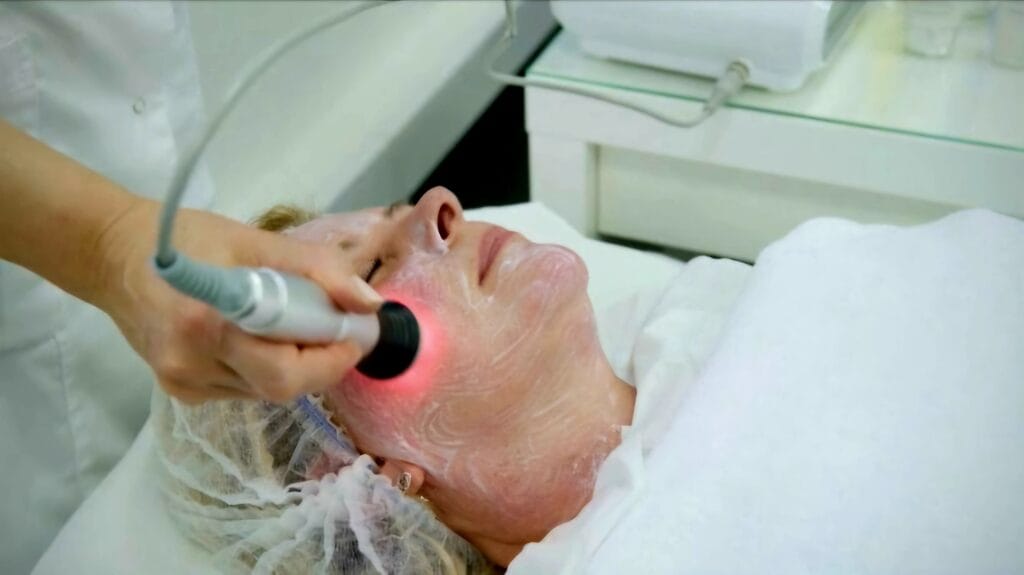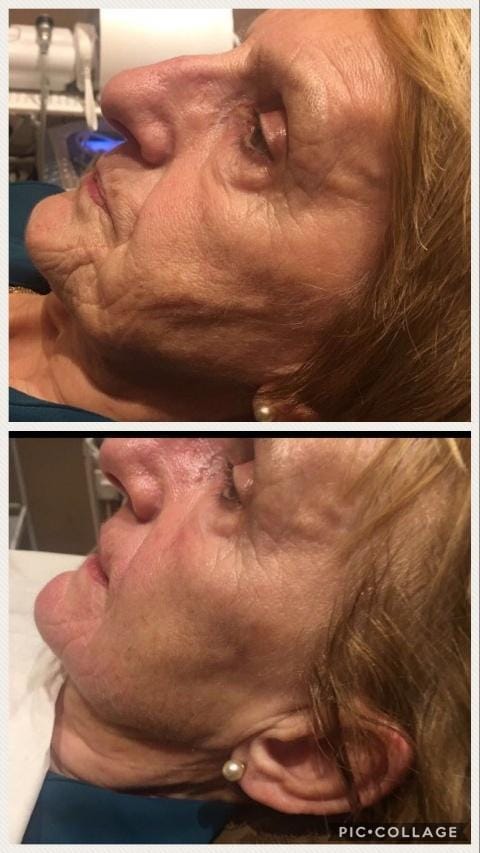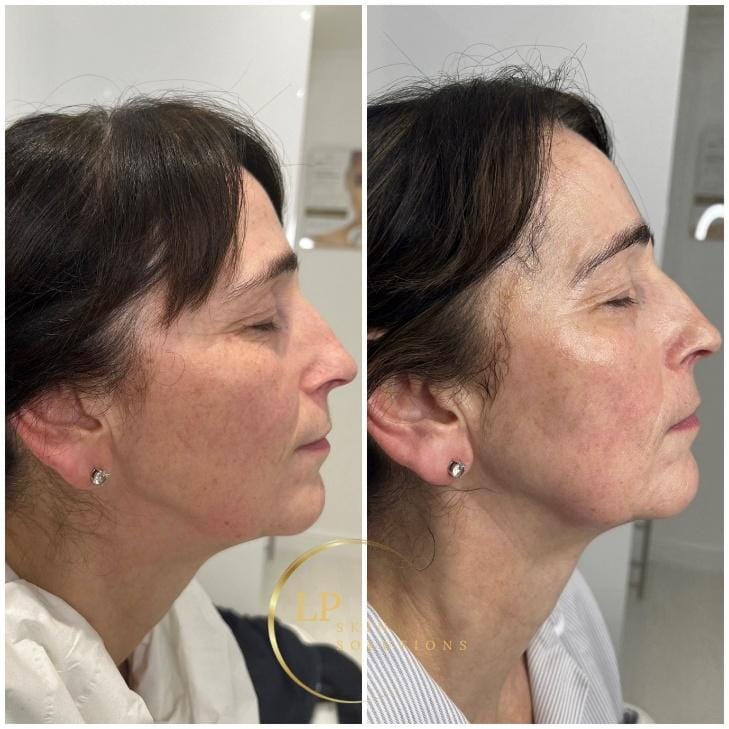Request a Free
Call Back

Radiofrequency (RF) Lift and Firm is a non-invasive cosmetic procedure that uses radiofrequency energy to stimulate collagen production, tighten the skin, and improve the appearance of fine lines, wrinkles, and sagging skin. It’s commonly used for facial rejuvenation and body contouring.
Benefits/applications of radiofrequency:
- Facial tightening.
- Anti-aging.
- Skin lifting and firming.
- Body contouring/ cellulite reduction.
Contraindications- who should avoid radiofrequency treatment:
- Patients with implantable medical devices such as a pacemaker or defibrillator.
- Those with collagen vascular diseases or autoimmune diseases (anti-inflammatory drugs that can interfere with collagen remodelling)
- Patients under radioactive treatment.
Treatment Summary
- Initial Treatments: 8 treatment sessions, 1 week apart
- Maintenance: 1 to 3 monthly (depending on skin concerns)
- Procedure Time: 40 minutes
- Return to Work: Immediately
- Anaesthetic: None
- Full Recovery: Immediately
- Sensitivity Period: 24-48 hours
- Duration of Results: 1-2 years with proper skincare
- Risks and Complications: Temporary sensitive skin and redness
Conclusion:
Radiofrequency lift and firm treatments are a popular, non-invasive option for tightening and rejuvenating the skin. It’s effective for both facial rejuvenation and body contouring, offering long-term benefits in skin elasticity, firmness, and reduced sagging. However, as with any aesthetic treatment, it’s important to follow the right precautions and aftercare to maximize the benefits and minimize any side effects.
On average depending upon your skin and age, you may need a course of 6-8 weekly sessions and then a monthly top-up session.
Request a Free
Call Back
Frequently Asked Questions
Heating of the Dermis: RF energy penetrates the skin and heats the dermal layer (beneath the surface), which causes the collagen fibers to tighten.
Collagen Production: The heat also stimulates the skin to produce new collagen, leading to long-term improvement in skin elasticity.
Non-invasive: Unlike traditional facelifts or body contouring surgeries, RF treatments are non-invasive and typically require no downtime.
Anti-aging: It helps in reducing fine lines and wrinkles by promoting collagen production.
Skin Lifting and Firming: RF improves skin elasticity and lifts the skin, especially around the chin, jawline, and neck area.
Body Contouring and Cellulite Reduction: RF can also be used on areas of the body like the abdomen, thighs, and arms to tighten skin and reduce the appearance of cellulite.
Avoid Active Skin Conditions: RF is not recommended for individuals with open wounds, eczema, recurrent herpes, or other skin infections.
Pregnancy: It’s generally advised not to undergo RF treatment while pregnant or breastfeeding, as the effects on the fetus or infant are not fully understood.
Skin Sensitivity: People with highly sensitive skin or conditions like rosacea may need to avoid RF treatments or use lower intensities, but there are other treatments available worth discussing with your expert practitioner.
Certain Medical Conditions:
A. People with heart conditions, pacemakers, or metal implants may not be suitable candidates for RF treatments.
B. Those with collagen vascular diseases or autoimmune diseases (anti-inflammatory drugs that can interfere with collagen remodeling).
C. Patients under radioactive treatment.
Avoid Sun Exposure: It’s best to avoid prolonged sun exposure before the procedure, as tanning can increase the risk of skin sensitivity and irritation.
No Topical Products: Avoid using harsh skincare products like retinoids or exfoliants 2-3 days before the treatment, as they can increase skin irritation.
Avoid Alcohol and Ensure Hydration: Avoid alcohol for at least 24 hours before and after the treatment, and keep yourself well-hydrated by drinking plenty of water in the days leading up to your treatment.
Avoid Medications That Thin the Blood: Medications like aspirin or blood thinners can increase bruising, so it's best to discuss with your practitioner how to proceed if you are on them for certain medical conditions.
Skin Sensitivity: The treated area may be sensitive to touch, heat, or pressure for a few hours.
Mild Discomfort: Some people may feel a warming or tingling sensation during the procedure, which is generally tolerable.
Bruising: Rarely, bruising may occur if the treatment is too intense, especially in people on blood-thinning medications or if the skin is sensitive.
Sun Protection: Apply a broad-spectrum sunscreen (SPF 30 or higher) to protect your skin from UV damage, as RF can make your skin more sensitive to the sun.
Avoid Heat: For 24-48 hours after the treatment, avoid hot showers, saunas, direct heat exposure, and strenuous exercise, as your skin may be more sensitive to heat.
Gentle Skin Care: Use mild, non-irritating skincare products for a few days after the treatment to avoid exacerbating any skin sensitivity.
No Makeup (First 24 Hours): It’s recommended to avoid applying makeup immediately after the treatment to let your skin breathe.
Other Treatments: Further laser treatment, chemical peels, and Botox/Dermal fillers can be resumed 2 weeks post-treatment.
1-2 Weeks: Gradual improvement begins as collagen production increases.
3-6 Months: Optimal results appear after a few months as collagen continues to build, leading to firmer, more youthful skin.
Maintenance: Results can last for 6 months to a year, depending on individual skin conditions, but periodic touch-ups may be needed to maintain the effects depending upon your skin type, initial skin concerns, and genetics.


